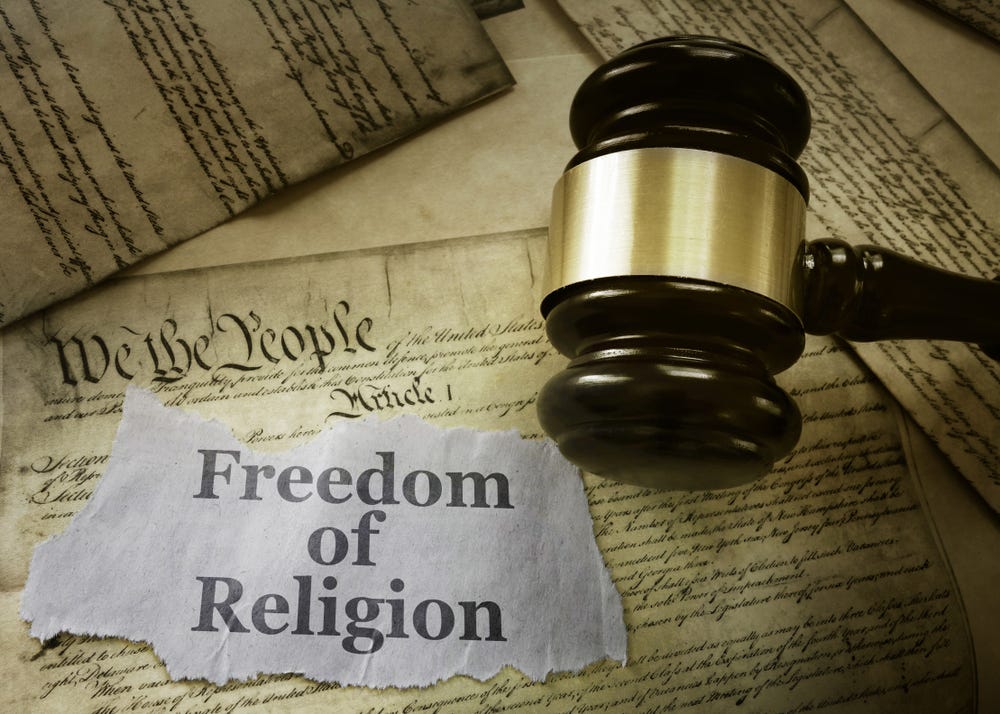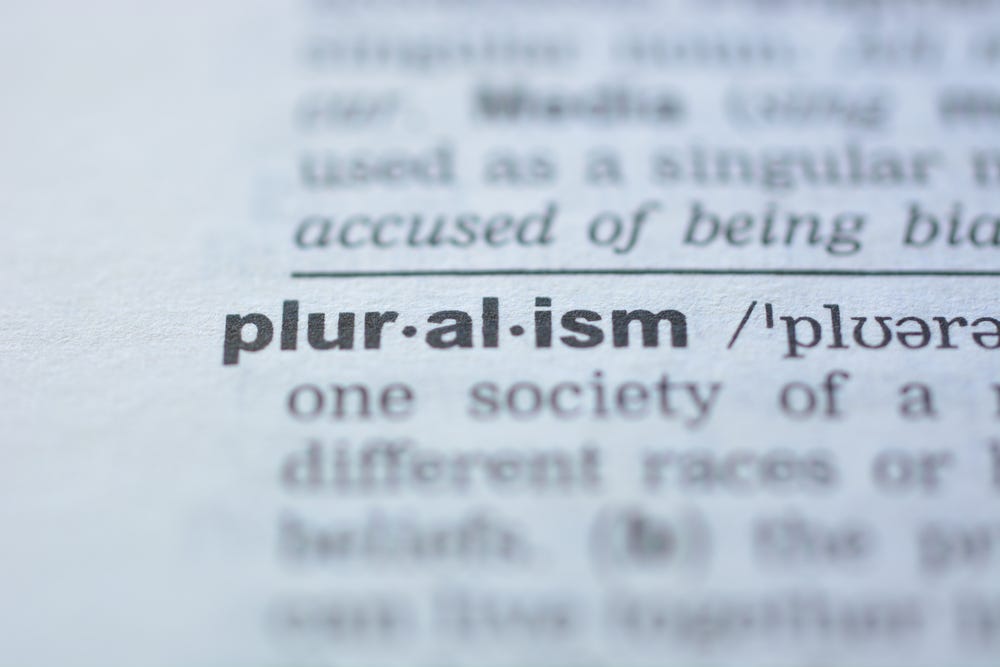E-Pluribus | August 1, 2023
Panic as a policy driver; an attack on that other part of the First Amendment; and learning how to stop worrying and love pluralism.
A round-up of the latest and best writing and musings on the rise of illiberalism in the public discourse:
Dara Macdonald: The Great Misinformation Panic
Whether you come from the land down under or not, Dara Macdonald warns at Quillette that, chances are, your government’s focus on “misinformation” is misguided and probably distracting from more pressing issues. Though Macdonald focuses on her country of Australia, she writes that governments around the world, democratic or otherwise, would do better to address real-world harms rather than potential or even imagined ones.
The definition of misinformation provided in Australia's new draft law reveals its inherent elitism. According to the guidance note, misinformation refers to "online content that is false, misleading or deceptive, that is shared or created without an intent to deceive but can cause and contribute to serious harm." Significantly, the definition exempts content produced by professional news outlets, governments, or educational providers, as well as artistic content.
This implies that information disseminated by mainstream media and the government can never be classified as misinformation or disinformation. But if the objective of this law is to prevent harmful lies, it is illogical to assume that an institution with more authority and power is less likely to cause harm with false information than a less authoritative source.
The exclusion of mainstream media and the government suggests that those drafting the law believe that they will never disseminate untrue information, or, that any false information they spread is for the greater good and therefore not harmful. Whilst the former belief is incredibly naïve, the latter belief is far more nefarious and explains why the law favours established information institutions by burdening new entrants with excessive regulation.
[ . . . ]
Critics of the concept of misinformation have likened it to the creation of a Ministry of Truth, but in reality, the law does not assign ACMA (the regulator under these new laws) the role of determining truth. ACMA's role is to compel digital platforms (broadly defined to include various content aggregators, from social media sites to dating apps) to establish processes for identifying and removing misinformation. In essence, the concept of misinformation transforms digital platforms into censors, similar to Oliver Cromwell's ordinance to printers. If a misinformation regime is imposed, digital platforms would be forced to become the arbiters of truth, rather than the regulator.
Read it all here.
Michael A. Helfand: Religious Discrimination in California
Many came to America in order to establish communities to practice their religion as they saw fit. Over the centuries, however, the US federal government and the courts have thrown up roadblocks that have encroached on the First Amendment guarantee. Michael Helfand writes at City Journal that a lawsuit involving California’s school funding regulations may soon give the Supreme Court an opportunity to tear down some of those barriers.
Under the federal Individuals with Disabilities and Education Act (IDEA), states receive federal funds to support students with disabilities. To remain eligible for those funds, states must establish rules to ensure that every special-needs child receives a free and publicly funded education. Most of the time, states satisfy this obligation through the public school system, serving children with varying learning needs.
The problem, however, is that public schools sometimes lack the resources, infrastructure, and expertise to meet the needs of some special-needs children. In California, under such circumstances, school districts partner with state-certified private schools. The process for certification is relatively intuitive, with nearly all the requirements related to the ability of the school to serve special-needs children. But one stands out: a school must be both nonpublic and nonsectarian. As a result, even if a private school is equipped to serve special-needs children that the public schools cannot, California will not certify that private school if it is “owned, operated, controlled by, or formally affiliated with a religious group or sect.”
One can understand why California has such a rule. Decades ago, the Supreme Court issued numerous decisions indicating that separation of church and state banned any government funding for religious schools. But since the early 2000s, the Court has changed its tune, interpreting the principle of separation of church and state simply to require that when it comes to funding, religious institutions should be treated no better, but also no worse, than analogous private institutions. Moreover, failure to treat religious institutions neutrally constitutes a form of religious discrimination prohibited by the First Amendment.
Thus, if a state is providing, say, historic-preservation grants for all private institutions, it must do so for all eligible institutions, including religious ones. And one would think that it also means that, if the state is certifying private schools to become special-needs schools, then religious schools should be eligible to apply as well.
Read the whole thing.
Jeff Frank: Learning to Love Pluralism
While America is celebrated as a great melting pot, many seem to prefer uniformity, particularly in the way they practice their politics. Jeff Frank suggests at Discourse Magazine that the best way to secure freedom for all America’s citizens is for each one of those citizens to not just put up with pluralism, but to love it.
As a philosopher of education committed to pluralism, it has been distressing to watch the discourse around schooling devolve into debates about what cannot be taught. For years, people on the left have argued that certain books must be excluded from the curriculum because they cause harm to individuals from marginalized groups. More recently, parents on the right have asserted their right over what is taught and even what children might be exposed to in their schools and public libraries.
While we should assume good faith from both sides, and while we also have to accept that it is worth weighing the educational value of teaching certain books, we also have to see that the race to prohibit and cancel has devolved into shouting matches that do not model the type of reasoning that leads to individual or societal flourishing.
It is especially important to see how the rush to cancel and prohibit affects a student’s mental health and ability to reason well. In the wider culture, parents aren’t suggesting that some titles are better educational tools than others and so deserve a place in the curriculum. They are arguing for full prohibition, suggesting that some books and some viewpoints have no value and are only harmful. The model of individual reasoning that this establishes is one where individuals are made to fear freedom of thought. If some viewpoints are so negative that they must be banned, then individuals become hesitant to think, fearing that freedom of thought might lead them to think things that no decent person would or should think. They become their own harsh taskmasters, policing their own thoughts instead of thinking freely and widely and looking for the most sincere and accurate ways to express what they believe.
[ . . . ]
Instead of fearing freedom, we should fear the increased centralized power we are asking schools to take on. Instead of spending so much time fighting over what schools and public libraries shouldn’t teach us, why aren’t we debating ways to promote prosperity and flourishing?
The best way to bring this outcome about would be to spend more time making suggestions about what young people should read, rather than excluding material and ideas from the curriculum. Instead of working to constrain how people with different views make their case, spend the time making yours. If we lived in a healthy culture, then we’d be creating educational materials that showcase the best arguments for every position out there. Students in high school would get in the habit of engaging with the best of both sides instead of pretending that the other side has nothing good to offer.
Read it all.
Around Twitter
Via the Foundation for Individual Rights and Expression (FIRE), another example of Elon Musk’s actions speaking louder than his tweets.
Via Jacob Mchangama of the Future of Free Speech and FIRE, a heads up that, at least on this occasion, there really is something rotten in the state of Denmark.
And finally, a handy chart to help you determine if you are privileged or oppressed. You’re welcome.










